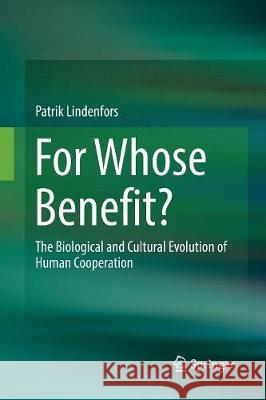For Whose Benefit?: The Biological and Cultural Evolution of Human Cooperation » książka
topmenu
For Whose Benefit?: The Biological and Cultural Evolution of Human Cooperation
ISBN-13: 9783319845104 / Angielski / Miękka / 2018 / 172 str.
Kategorie:
Kategorie BISAC:
Wydawca:
Springer
Język:
Angielski
ISBN-13:
9783319845104
Rok wydania:
2018
Wydanie:
Softcover Repri
Ilość stron:
172
Waga:
0.26 kg
Wymiary:
23.39 x 15.6 x 0.99
Oprawa:
Miękka
Wolumenów:
01
Dodatkowe informacje:
Wydanie ilustrowane











